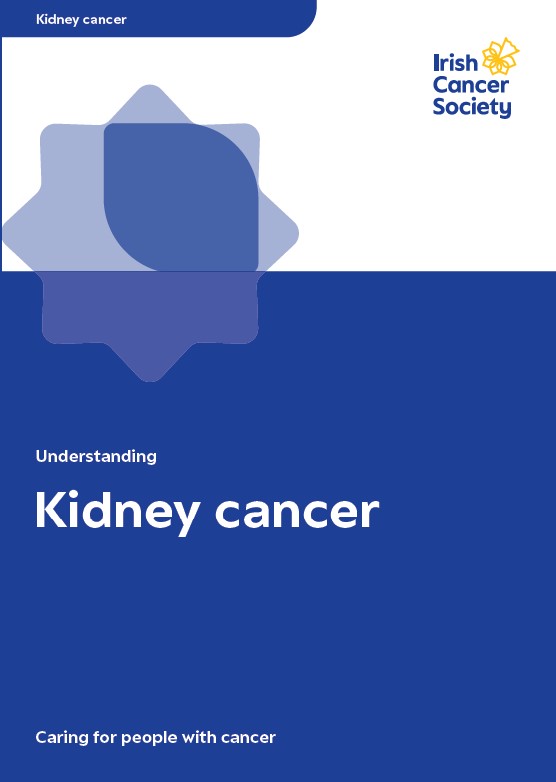Kidney cancer
Treatment
How is kidney cancer treated?
About 9 out of 10 kidney cancers are renal cell cancer (RCC) - also known as renal cell adenocarcinoma. The most common type of renal cell cancer is clear cell renal cell cancer.
The treatment we describe on these pages is mostly for renal cell cancer. Talk to your team to find out more about other, less common kidney cancers as the tests and treatment may not be the same.
Surgery
Surgery is the main treatment for kidney cancer that hasn’t spread. Surgery aims to remove the tumour. Early-stage kidney cancer is often cured by surgery alone.
Read more about surgery for kidney cancer.
Surveillance
This means monitoring abnormal areas like very small lumps in your kidney with regular CT scans. Often these lumps (called small renal masses by doctors) need no treatment and cause you no symptoms or harm.
Your doctor will talk to you about surveillance if they think it is the best option for you. Surveillance may also be recommended if you have other medical conditions that mean it is better for you to avoid surgery.
Alternatives to surgery
If your cancer is small or you are not suitable for surgery, your doctor may discuss one of the following treatments:
This treatment uses heat to destroy the cancer cells. It can be used if you have small kidney tumours and you cannot have surgery.
This procedure takes about 20 minutes and is often done in the X-ray department. A needle-type instrument is placed in the kidney tumour through your skin. A CT scan guides your doctor to put the needle in place. Once the needle is in place, a machine generates heat, which kills the cancer cells.
This treatment is easier on the body than surgery, but there is a slightly higher risk that some cancer cells will remain active after treatment, meaning you might need a second treatment.
This treatment is only used in very specific situations and often depends on the location of the cancer. It is sometimes used for older patients or for people who are not fit for surgery.
You doctor may recommend a drug treatment for you:
- If the cancer has spread
- If the cancer returns after surgery
Targeted therapies
Targeted therapies are drugs that work by targeting certain parts of cancer cells that make them different from other cells. They help to kill cancer cells or stop them from growing and spreading. Immunotherapy boosts your body’s immune system to fight cancer.
The main type of targeted therapies used to treat kidney cancer are:
- Cancer growth inhibitors
- Angiogenesis inhibitors
Cancer growth inhibitors: Cancer cells need to communicate with each other to grow and multiply. They do this through a series of chemical signals. Cancer growth inhibitors interrupt the communication process and prevent the cancer from developing.
The main group of targeted therapy drugs used for metastatic (advanced) kidney cancer is tyrosine kinase inhibitors (TKIs). These drugs block chemicals called tyrosine kinases. Tyrosine kinases help cells to grow, so blocking them stops cells growing and dividing. Examples of TKIs are: sunitinib (Sutent®), axitinib (Inlyta®), pazopanib (Votrient®), sorafenib (Nexavar®), cabozantinib (Cabometyx®) and tivozanib (Fotivda®). Cancer growth inhibitors are usually given as tablets.
Angiogenesis inhibitors interfere with the growth of blood vessels. This means the cancer doesn't receive the oxygen it needs to survive. This treatment is usually given by injection into a vein. Examples include: bevacizumab (Avastin®), everolimus (Afinitor®) or temsirolimus (Torisel®).
Read more about targeted therapies.
Immunotherapy
Immunotherapy drugs boost your immune system to attack the cancer cells and stop them growing. There are different types of immunotherapy drugs including monoclonal antibodies, checkpoint inhibitors and cytokines.
Read more about immunotherapy.
Radiotherapy uses high-energy waves to kill cancer cells. Stereotactic radiotherapy uses smaller, more precise radiation beams than standard radiotherapy. These beams are targeted at your tumour from several different angles, which combine to give a high dose of radiation. It may be used for small tumours that are not suitable for surgery.
Read more about radiotherapy.
Arterial embolisation may be used to block the blood supply to the part of the kidney with cancer if you cannot have surgery.
This is not a cure for kidney cancer, but it can help to stop it growing.
This procedure is done under local anaesthetic in the X-ray department. You will be given some medicine to make you sleepy. A small cut is first made in your groin and a narrow tube put into the main blood vessel that flows to your kidney. Small pieces of a special gelatin sponge are then injected through the tube into the blood vessel. The sponges block the blood flow to your kidney or to the part of the kidney that contains the cancer.
Will I get side-effects?
The type of side-effects you get will depend on the type of treatment, the dose, the duration and your own general health.
Ask your doctor or nurse about any possible side-effects before your treatment starts. You can read about the different treatments to find out more about possible side-effects. We also have information to help you cope with side-effects and symptoms.
Treating kidney cancer that has spread (metastatic cancer)
If your cancer has spread, treatment is usually to try to control the cancer rather than to cure it. Targeted therapy drugs are often used to keep metastatic kidney cancer under control. Or you may have arterial embolisation or radiotherapy to relieve symptoms. You may also have surgery.
Read more about how to cope with metastatic cancer.
Continue reading about kidney cancer




Get help & support

Support Line
Free support pack



